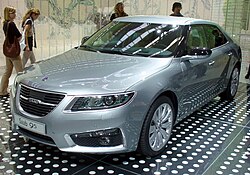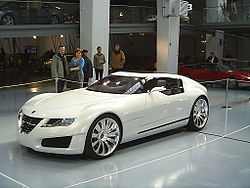- Saab 900 Aero
- Saab 9000 Aero
- Saab 9-3 Aero
- Saab 9-3 Aero
- Saab 9-3 SportCombi Aero
- Saab 9-3 Aero XWD
- Saab 9-3 Convertible Aero
- Saab 9-5 Aero Estate
- Saab 9-5 Aero sedan / saloon
- Saab 9-5 Aero XWD 2nd Generation
- Saab 9-2X Aero
- Saab 9-4X Aero
- Saab 9-7X Aero
- Saab Aero-X Concept
This article needs additional citations for verification .(February 2023) |
 | |
| Company type | Division |
|---|---|
| Industry | Automotive industry |
| Founded | 1983 |
| Products | |
| Services | Research and development |
| Owner | NEVS |
| Parent | Saab |
Saab Aero was the high-performance division of car manufacturer Saab Automobile. The Aero name refers to Saab's history as an aircraft manufacturer. The first Aero model was the 1984 Saab 900 Aero, and every subsequent model released by Saab was then offered with the optional Aero trim level. The final Aero model was the 2014 Saab 9-3, which was manufactured by the holding company NEVS. This was also the last time a Saab-branded vehicle has been manufactured by the holding company. [1]













